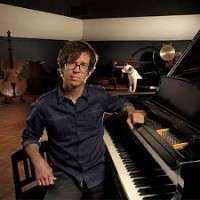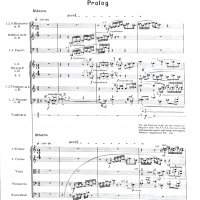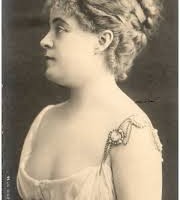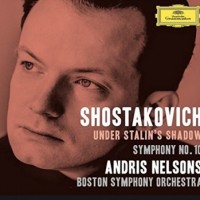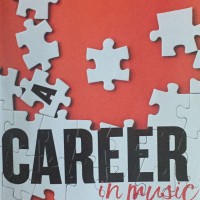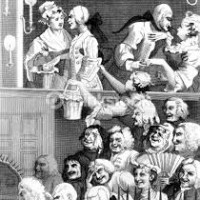[contextly_auto_sidebar] So the Declassified show at the National Symphony a week ago didn’t strike me as a success. Declassified, as I said in my last post, is a series that the orchestra and its parent institution, the Kennedy Center, created to reach the fabled new young audience. Younger people certainly showed up on Friday, to hear Ben Folds, who was playing a piano concerto he’s written. But as I said in my post, they weren’t a new NSO/KenCen crowd. They were Ben Folds fans, coming to see their favorite, with no reason, left to … [Read more...]
Cautionary words
[contextly_auto_sidebar] You might think — given my views on the future of classical music — that I’d welcome what I heard at the Kennedy Center Friday night, when the National Symphony played Ben Folds’ Piano Concerto, with Folds himself as soloist. Because there it was. A piano concerto by an indie rock star. The concert hall full of younger people. You might think I’d tweet my excitement about an audience much younger than usual. A simple fact But I can’t quite go there. First because -- and this is just a simple fact, not a way of … [Read more...]
They just don’t do it
[contextly_auto_sidebar] "They"means conductors. "Don't do it" means that when they conduct Lulu, they don't follow the markings in Berg's score. I've posted about that, after seeing the movie-theater stream of the Met's new Lulu. But now I've gotten the Lulu full score from the Juilliard library, and looked at it while I listened to some recordings. And the problem is worse than I thought. On Facebook, I went on at some length about this, but I'll keep it simple here. In the prologue to the opera, just 4 1/2 minutes of music, … [Read more...]
Making Lulu musical
[contextly_auto_sidebar] I’ve seen two powerful operas in the past week — Philip Glass’s Appomattox at the Washington National Opera, and Lulu at one of the Met’s HD movie showings. Appomattox might be Philip’s masterpiece, and certainly the evenings I spent with it — I saw it twice — were some of the most intense and rewarding time I’ve ever had with classical music. I’ll write about it after Thanksgiving, but now I’ll share some thoughts about Lulu that I posted on Facebook. The new William Kentridge production (a work of art in itself) is … [Read more...]
Time to help
[contextly_auto_sidebar] I’m often asked to support things out in the classical music world — causes, performances, projects, groups, crowdfunding campaigns. And I almost always don’t do it, because when these requests get numerous, they could overwhelm both me and the blog. And diminish whatever force my support might have. But Groupmuse is an exception. They’ve just begun a Kickstarter campaign, and I urge to you support it. I’m going to. This is an organization I’ve underestimated. Maybe not entirely my fault, because I think they … [Read more...]
In the wavelength
[contextly_auto_sidebar] Audience engagement — it’s a weak strategy. Never mind that it can seem to work. A friend sent me notes from the National Arts Marketing Project Conference, with details of the Cleveland Public Theater, and its impressive season, full of plays on subjects that just seem to scream contemporary relevance. But still they wanted to boost attendane on slow nights. So they added some audience engagement — attrractive things, happening all around the art, in this case free beer — and ticket sales went up. Which … [Read more...]
Words that worry me
[contextly_auto_sidebar] Audience engagement. Such a buzzphrase in the arts these days. The subject of the National Arts Marketing Project Conference, held in Salt Lake City November 6th through 9th.A conference full of useful suggestions, hopeful case studies. Success stories! In which arts organizations learned to engage their audience. A week or so earlier, Matt Lehrman — a terrific “Audience and Customer Experience (ACX) expert” (as he describes himself) — and fellow ArtsJournal blogger — asked me about audience engagement. Did I have … [Read more...]
Maybe they should be interested, but…
[contextly_auto_sidebar] I have to admit I’m a little surprised by the comments on my last post, which was about the way we in classical music grasp for relevance by programming concerts built around things in history — Shostakovich and Stalin, for instance — that not many people care much about. And thereby showing how not relevant we are. The response surprised me. But then after more than 30 years as a professional writer I know that even smart and sympathetic readers don’t always get the full meaning of everything they read. And that, … [Read more...]
Enough of this
[contextly_auto_sidebar] This summer came a CD release which — with all respect to the major classical music forces involved — is the kind of project I wish we wouldn’t do. This was a Deutsche Grammophon recording, Andris Nelsons conducting his Boston Symphony in two Shostakovich works, the Tenth Symphony and the Passacaglia from Lady Macbeth of Misensk, packaged unitl the title Shostakovich Under Stalin’s Shadow. And it all seems so thoughtful, so serious. And so connected to the larger world. The new recording initiative will focus … [Read more...]
Who’s our competition?
[contextly_auto_sidebar] Or, rather, who’s classical music’s competition? Especially when we go out in the world, who are we competing with? Which is something anyone in the field might do, whether you’re an entrepreneurial chamber ensemble, or a major opera company. You need to find a new audience. So when you look for one, who are you competing with? This is the subject of a piece I have in the new issue of Chamber Music magazine. To read it, follow the link, and go to page 66. I’m asking an important question. When we work with the … [Read more...]
How they made their money
[contextly_auto_sidebar] And now my final post about changing the conservatory curriculum. In the post I did last, I talked about music history, or rather classical music history. And how — while we should find a way to teach the history of other musics — even when we teach classical history we leave a lot out. Namely, the real stuff of music in the past. How it lived, how it functioned, how listened, how they listened. And — very important — how musicians, including the great composers, made their living. Working for the man If I ask … [Read more...]
Flights of crazy fancy
[contextly_auto_sidebar] Now my fourth — and next to last — post on changing the conservatory curriculum. I’ve linked the others at the end. Remember that I’m offering free consulting sessions! Originally I’d thought they’d be about changing the curriculum, but in fact the gratifying response has also come from people who wanted help with other things. Especially career development. Which I’m happy to help with, just as I’m happy to talk about anything in your work that might need an outside eye, and some advice. Of course one reason I’m … [Read more...]
Music theory for a new century
[contextly_auto_sidebar] So now — continuing about changes in the conservatory curriculum — some thoughts about how to teach music history and theory. And remember that I’m offering free consulting sessions to anyone who’d like to talk about these issues. I can help! Contact me. I might note to start that there might be classes on what’s happening now. What’s the state of classical music? What are the problems in the field, how are things changing? And why — in language we could use with nonbelievers — is classical music worth … [Read more...]
The highest road
[contextly_auto_sidebar] Someone who asked me for one of my free consultations — see below! — said that as a conservatory teacher he feels like he’s surrounded by “unkown unknowns” (to use a famous Donald Rumsfeld phrase). I’m sure many people at conservatories feel like that. And entrepreneurship can be one of those unknowns. Such a popular buzzword, but what does it really mean, and how much of it just might be hype? Good questions. But there are answers, and showing what some of them are is one way I can help. Contact me now for a free … [Read more...]
Changing the curriculum
[contextly_auto_sidebar] Time now to talk about the curriculum at conservatories, about what classical musicians should learn in their professional education. As I said in an earlier post, this was something I was eagerly asked to speak about at the School of Music, Theatre and Dance at the University of North Carolina at Greensboro, LINK where the music department is thinking of curriculum change. And of course I’ve been close to the great transformation at the DePauw School of Music, where the curriculum is being reinvented for the 21st … [Read more...]


